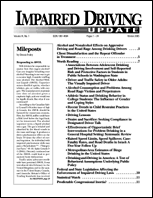License Revocation as a Tool for Combating Drugged Driving
Author: Stephen K. Talpins, J.D..; Robert L. DuPont, M.D..; Robert B. Voas, Ph.D.; Erin Holmes, M.A..; Kevin A. Sabet, Ph.D..
Source: Volume 18, Number 02, Spring 2014 , pp.29-33(5)

< previous article |next article > |return to table of contents
Abstract:
As more and more states contemplate decriminalizing low-level drugs, law enforcement and policymakers have expressed concerns about the effect of greater access to drugs. Recent reports indicate that more than 25% of high school seniors have either driven after using alcohol or drugs, or been the passenger with someone who has, and the rates are expected to increase. Rates among this cohort of driving after smoking marijuana have increased over the past three years. This article recommends the use of a regulatory tool with which most law enforcement members are already familiar—the ALR—as a way to stem the predicted increases in these activities. The authors argue that the development of a model ALR provision for drugged drivers would serve as one valuable method of maintaining safety on the roads as other laws and regulations change the landscape of impaired driving.Keywords: administrative license revocation (ALR); toxicology; Impaired driving rate decline; National Highway Traffic Safety Administration; Fatality Analysis Reporting System (FARS); Bell v. Burson; broadly defined statute; on-site testing capabilities; pres
Affiliations:
1: Institute for Behavior and Health; 2: Institute for Behavior and Health; 3: Traffic Safety Research; 4: University of Florida’s Drug Policy Institute; 5: Institute for Behavior and Health.